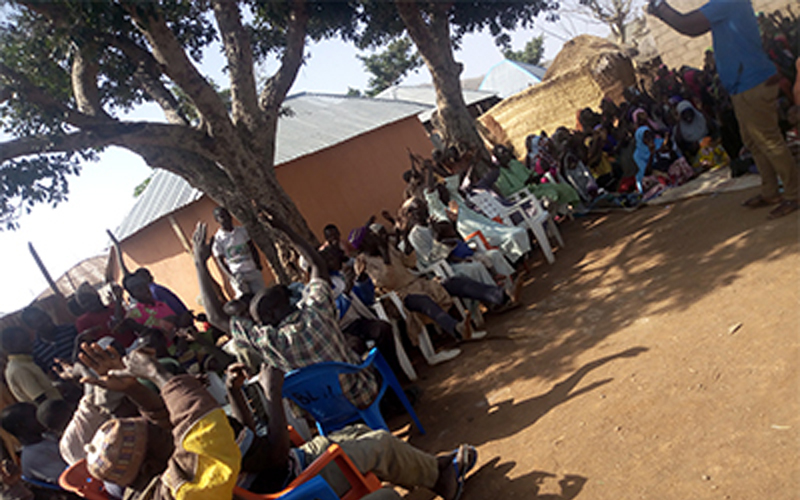+234 912 443 7374

At Rural Water Access Foundation (RUWAF), we recognize that the most effective way to eliminate open defecation and improve sanitation in rural communities is by empowering the communities themselves. Our Community-Led Total Sanitation (CLTS) program is an innovative, people-centered approach that focuses on behavior change and community mobilization to eliminate open defecation and promote sanitation improvements.
The first step in implementing the CLTS program is engaging the community through awareness-raising sessions. RUWAF:
- Holds community meetings to discuss the dangers of open defecation and its link to health problems such as cholera, diarrhea, and malnutrition
- Facilitates participatory exercises where community members analyze the impact of open defecation on their health, environment, and dignity
- Uses visual aids, such as photos and maps, to demonstrate the effects of poor sanitation and to create a sense of urgency
- Encourages collective ownership by making communities responsible for finding their own solutions
We emphasize the importance of the community being the main driver of the process rather than imposing external solutions.
As part of the CLTS process, RUWAF helps the community: - Map existing sanitation practices and the locations of open defecation hotspots using participatory tools - Identify sanitation-related problems (e.g., lack of latrines, poor waste management practices) - Develop a community action plan for eliminating open defecation and improving hygiene practices This participatory approach helps the community take ownership of the situation and understand that the responsibility lies with them.
In this crucial phase, RUWAF facilitates triggering activities to create a sense of shame and disgust about open defecation:
- Public demonstrations are held where community members collectively identify contamination sources and understand the transmission pathways of diseases caused by poor sanitation
- Shaming activities such as “smelling” feces or exploring contamination in open spaces, which encourages people to recognize the risks and unhealthy practices they are involved in
- Storytelling and drama sessions are organized to show the link between open defecation, health issues, and environmental pollution, making the problem real for the community
This phase encourages the community to commit to a clean environment and be willing to adopt new sanitation practices.
Following the triggering process, RUWAF works with the community to promote the construction of sanitation facilities (latrines):
- We provide training on affordable and locally available materials for latrine construction, including the use of local artisans or community members skilled in latrine building
- Encourage DIY solutions (Do It Yourself), allowing families to construct simple and low-cost latrines that meet basic hygiene standards
- Subsidize construction materials where necessary, to ease financial burdens on the most vulnerable families
We promote the idea that every household should have its own private latrine, ensuring privacy, dignity, and health.
Once latrines are built, RUWAF works with the community to monitor progress towards achieving Open Defecation-Free (ODF) status:
- Field visits and inspections are conducted to verify the construction of latrines and adherence to sanitation standards
- Community monitoring groups are formed to track the sanitation progress and ensure that no one is practicing open defecation
- Certification of ODF status is given once the entire community has committed to ending open defecation, and all households have access to functioning latrines
This community-led monitoring process builds local accountability and ensures sustainability.
Beyond the construction of latrines, RUWAF also focuses on promoting hygiene education to ensure that good sanitation practices are sustained:
- Hygiene promotion sessions are held to teach the importance of handwashing, safe water handling, and the safe disposal of child feces
- Training in menstrual hygiene management is integrated into the CLTS process, especially for girls and women, as part of ensuring that sanitation and hygiene needs are met for all members of the community
- We use demonstrations, songs, and theater to communicate key hygiene messages and engage community members
These sessions help reinforce healthy behaviors, such as washing hands after using the toilet, eating, and before preparing food.
RUWAF believes that sustainability is key to the long-term success of CLTS interventions:
- We encourage the formation of sanitation committees that oversee the maintenance of latrines, conduct regular hygiene education activities, and lead efforts to prevent the relapse into open defecation
- We link CLTS activities with other community development programs such as water supply systems and agricultural initiatives, ensuring that improved sanitation is part of an integrated community approach
- We promote local entrepreneurship, by encouraging individuals to start small businesses around latrine construction and maintenance
By making sanitation a community-driven process, we ensure that CLTS interventions are self-sustaining.
In addition to working with individual communities, RUWAF also works to:
- Advocate for policy change at local, state, and national levels to recognize and support CLTS as a critical approach to achieving universal sanitation coverage
- Scale up successful interventions by using ODF communities as models and sharing lessons learned with neighboring areas or regions
- Engage in public awareness campaigns to encourage widespread adoption of CLTS practices and inspire other communities to follow suit
This advocacy strengthens the commitment to ending open defecation and creates an enabling environment for community-led sanitation improvement.
Through these steps, RUWAF’s CLTS program empowers communities to take charge of their sanitation, ensuring better health outcomes, dignity, and a cleaner environment.